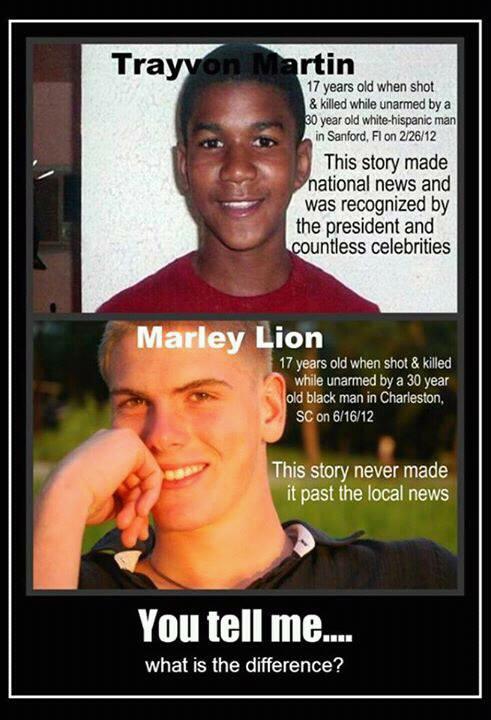
Claim: Graphic compares the shooting deaths of Trayvon Martin and Marley Lion.
Example: [Collected via Facebook, July 2013]
A photo that has been circulating on social media shows a picture of Trayvon Martin and Marley Lion and states Martin's case made national news and "was recognized by the president and countless celebrities," while Lion's story "never made it past the local news":

Origins: In the early morning hours of
[A surveillance] video shows someone walking up to the vehicle, doing something near the driver's-side front door, and then leaving the scene when the vehicle's headlights start flashing on and off. Detective Richard Burckhardt, the lead investigator in the case, says this is the point where Lion presses a button on a key fob to trigger the vehicle's alarm system. About
Marley Lion, a recent graduate of Academic Magnet High School, was shot inside his Nissan Pathfinder in the parking lot by Famous Joe's Bar and Grill at
Six weeks later, with the assistance of the Secret Service and the U.S. Bureau of Alcohol, Tobacco, Firearms, and Explosives, Charleston police arrested four suspects in the case:
The suspects were charged with the following crimes: Ryan Deleston, 30: Murder, attempted armed robbery, use of a deadly weapon during a violent crime, and possession of a handgun with an obliterated serial number. Bryan Rivers, 27: Murder, attempted armed robbery, distribution of an imitation controlled substance, possession of a firearm by a violent convicted felon, and possession of a handgun with an obliterated serial number Julius Brown, 32: Murder, obstruction of justice, and attempted armed robbery George Brown, 27: Accessory after the fact of murder and possession of a handgun with an obliterated serial number
Charleston police have arrested four people in connection with the shooting of 17-year-old Marley Lion in a West Ashley parking lot. The arrests came after a six-week investigation that involved surveillance video enhancement from the Secret Service and an undercover gun-buying operation with help from the U.S. Bureau of Alcohol, Tobacco, Firearms, and Explosives.
It is true that the Marley Lion case received little news coverage outside the Charleston area, but the comparison to the Trayvon Martin case is something of a false equivalency. In the Trayvon Martin case, there was never any doubt as to the identity of his killer (George Zimmerman), yet several weeks elapsed before the shooter was charged with a crime and taken into
In the
Marley Lion case, the identity of the killer(s) was initially unknown until likely suspects were determined through police investigation; once those suspects were identified, they were promptly arrested and charged with a multiplicity of crimes, hence Lion's murder was never associated with a public perception of "justice denied" or the suggestion that his race was an element of either the commission or prosecution of his killing.
The sad fact is that the U.S. sees about 16,000 homicides per year, a number which precludes more than a scant handful of them receiving national news coverage — generally the ones that do garner national attention involve political or social controversy (Trayvon Martin), lurid details (Jodi Arias), celebrities (O.J. Simpson), or victims such as pregnant women, mothers, and children who are perceived as particularly vulnerable and sympathetic (Laci Peterson, Casey Anthony).
Marley Lion's death, although no less important than anyone else's, involved none of the extraordinary factors that propel a few select homicide cases into the national spotlight, so — just like thousands of other murder victims — his death remained a local news story.
Last updated: 16 July 2013
Sources: |
Bowers, Paul. "Surveillance Footage Shows Shooting of Marley Lion." Charleston City Paper. 19 June 2012. Bowers, Paul. "Four Arrested in Marley Lion Murder." Charleston City Paper. 31 July 2012. Rivera, Ray. "NAACP President References Marley Lion in Trayvon Martin Statement." WCSC-TV [Charleston]. 16 July 2013. [Charleston] Post and Courier. 16 July 2013.
